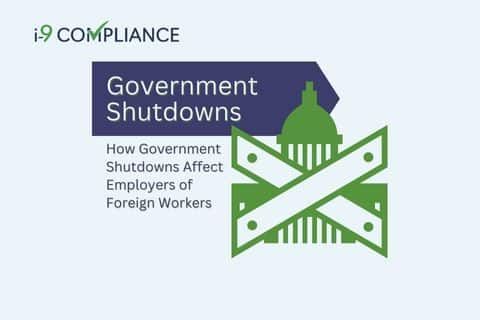How Government Shutdowns Affect Employers of Foreign Workers

October 16, 2023
Due to the struggle for Congress to reach a consensus, many have questioned how a government shutdown would affect employers and foreign national workers. Without a resolution, the impact would have significantly impacted those using the H-1B, H-2A, and H-2B programs.
A shutdown would have directly affected the Department of Labor (DOL). This Department adjudicates Labor Condition Applications and requests Prevailing Wage Determinations. Many employers of foreign national workers rely on these critical functions for H-1B petitions and permanent labor certifications (PERMs).
The DOL has explained how government shutdowns would affect it, such as halting several processes. One example includes stopping all foreign labor applications, which foreign national workers need for short or extended employment periods. Another effect includes disabling the Foreign Labor Application Gateway (FLAG) system. Pausing this system would prevent employers from accepting new applications. It also prevents them from printing existing approved applications during the government shutdown.
A government shutdown would also affect the U.S. Customs and Border Patrol (CBP). The CBP would likely cease processing applications filed at the border, such as the nonimmigrant NAFTA Professional (TN) visa. However, the agency would continue general operations at ports of entry.
In more positive news, a government shutdown would not affect the Department of State (DOS) and U.S. Citizenship and Immigration Services (USCIS) operations. The loss of federal funding would not affect the DOS, as the Department operates through collected fees. However, consulates can run the risk of receiving insufficient funds. Such cases can lead to consulates ceasing operations not considered critical.
The USCIS is similarly funded by filing fees, meaning immigration programs funded by filing fees will likely continue to operate. Unfortunately, some programs not funded by fees will likely cease. These include the EB-5 visa programs, Conrad 30 J-1 doctors, non-minister religious workers, and E-Verify.
In the case of a government shutdown, the DHS will likely not penalize employers for delays in completing the E-Verify process. Instead, the Department may follow similar procedures to prior shutdowns. Examples include providing extensions of deadlines and alternative functions to become compliant after such a shutdown ends.
In such a circumstance, employers should focus on remaining compliant with employment eligibility verification requirements (Form I-9). The government still requires compliance even during a government shutdown. As such, employers should consider utilizing an electronic I-9 management system. This system guides employers through the verification process. It also ensures uniform compliance and offers secure digital storage of all forms.
Make compliance less complicated for your business by automating your employment eligibility verification with I-9Compliance.